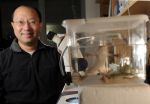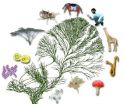(Press-News.org) An old pinworm medicine is a new lead in the search for compounds that block a signaling pathway implicated in colon cancer. The findings, reported by Vanderbilt University Medical Center researchers in the November issue of Nature Chemical Biology, suggest a fresh approach for developing therapeutics that target the pathway.
More than 90 percent of sporadic (non-inherited) colon cancers – the second deadliest type of cancer in the developed world – are caused by mutations that result in inappropriate activation of the Wnt (pronounced "wint") signaling pathway. Blocking this pathway has been a desirable therapeutic target, but its complexity has made it difficult to determine which molecular participants to inhibit.
"There's no obvious target in the pathway where we could say, 'OK, if we inhibit the activity of this protein, that will inhibit Wnt signaling,'" said Ethan Lee, M.D., Ph.D., associate professor of Cell and Developmental Biology, Vanderbilt-Ingram Cancer Center researcher, and senior investigator of the current study.
Lee and his colleagues were interested in understanding the details of the Wnt pathway, which also plays an important role in early development. In frogs, loss of early Wnt signaling results in headless embryos; too much early Wnt signaling causes two heads to form.
"To me, that's really quite remarkable and says this pathway is biologically important," Lee said.
To explore Wnt signaling at a biochemical level, Lee and his team developed frog embryo extracts and showed that this cell-free system retained many events of the Wnt signaling pathway. Using this system, they established a screening strategy to search for chemicals that modify Wnt signaling – with the goal of learning more about the biology of the pathway.
The investigators screened several thousand chemical compounds, from a "library" of FDA-approved drugs and other bioactive compounds. They found that pyrvinium, an FDA-approved anti-parasite drug, blocked Wnt signaling in the frog extracts.
They tested pyrvinium in cultured cells and in multiple animal models of early development (frogs, nematode worms, fruit flies) and demonstrated that in each case, pyrvinium blocked Wnt signaling. They also found that in cultured colon cancer cells, pyrvinium inhibited both Wnt signaling and cell proliferation.
To identify the target of pyrvinium, Lee and his colleagues combined four isolated proteins, all with known roles in the Wnt pathway. They found that pyrvinium increased the activity of one of the proteins, an enzyme called casein kinase 1alpha (CK1alpha).
The activation of a kinase – as a way to inhibit the Wnt signaling pathway – was unexpected, Lee said.
"The targeted cancer therapies that are being intensively studied right now are mostly kinase inhibitors," he said. "It's intriguing to think that maybe there are certain kinases – like CK1alpha – that we can activate as targets for treating cancer."
Pyrvinium stays in the gastrointestinal tract (to treat pinworms), so Lee is working with collaborators in the Vanderbilt Institute of Chemical Biology to develop new CK1alpha inhibitors. He is also collaborating with Pampee Young, M.D., Ph.D., associate professor of Pathology and Medicine, to study the Wnt pathway's role – and pyrvinium's effects – on cardiac repair after myocardial infarction.
"Our original goal in developing the screening strategy was to find compounds that would tell us something about the biology of the Wnt pathway," Lee said. "It's an added bonus that these compounds could be useful therapeutic agents in heart disease or cancer."
The frog embryo extract and screening strategy may also be applied to identifying compounds that modify other developmentally important signaling pathways, Lee added.
INFORMATION:
Curtis Thorne, Ph.D., is the first author of the Nature Chemical Biology paper. The Gastrointestinal Specialized Program of Research Excellence (GI SPORE) at Vanderbilt-Ingram, the American Cancer Society, and the National Institutes of Health supported the research.
New path for colon cancer drug discovery
Approved drug identified as inhibitor of Wnt signaling
2010-11-20
ELSE PRESS RELEASES FROM THIS DATE:
Scripps Research scientists identify first synthetic activator of 2 critical proteins
2010-11-20
JUPITER, FL, November 19, 2010 – Scientists from the Florida campus of The Scripps Research Institute have identified a novel synthetic activator of a pair of proteins that belong to a protein family playing key roles in human metabolism and immune function. The discovery could provide new and potentially more effective therapeutic approaches to diseases ranging from diabetes to osteoporosis.
The study was published in the November issue (Volume 5, Issue 11) of the journal ACS Chemical Biology.
"This new compound is particularly important because it works in vivo, ...
Invention helps students learn surgical techniques before operating on patients
2010-11-20
FORT COLLINS - In the last 50 years, modern medicine has made astounding advances in surgery, yet many of today's veterinary and human medicine students still hone basic surgical and suturing skills on carpet pads and pig's feet before transitioning to a live patient. An invention by Colorado State University veterinarians provides students with artificial body parts that look, feel, behave, and even bleed just like real skin, muscles and vessels.
The artificial replicas of sections of human and animal bodies -- such as an abdominal wall -- give students a realistic learning ...
UH physicists study behavior of enzyme linked to Alzheimer's, cancer
2010-11-20
HOUSTON, Nov. 19, 2010 – University of Houston (UH) physicists are using complex computer simulations to illuminate the workings of a crucial protein that, when malfunctioning, may cause Alzheimer's and cancer.
Margaret Cheung, assistant professor of physics at UH, and Antonios Samiotakis, a physics Ph.D. student, described their findings in a paper titled "Structure, function, and folding of phosphoglycerate kinase (PGK) are strongly perturbed by macromolecular crowding," published in a recent issue of the journal Proceedings of the National Academy of Sciences, one ...
New study into bladder regeneration heralds organ replacement treatment
2010-11-20
Researchers in the United States have developed a medical model for regenerating bladders using stem cells harvested from a patient's own bone marrow. The research, published in STEM CELLS, is especially relevant for paediatric patients suffering from abnormally developed bladders, but also represents another step towards new organ replacement therapies.
The research, led by Dr Arun Sharma and Earl Cheng from the Feinberg School of Medicine at Northwestern University and Children's Memorial Research Center, focused on bone marrow mesenchymal stem cells (MSCs) taken from ...
Busy microbial world discovered in deepest ocean crust ever explored
2010-11-20
CORVALLIS, Ore. – The first study to ever explore biological activity in the deepest layer of ocean crust has found bacteria with a remarkable range of capabilities, including eating hydrocarbons and natural gas, and "fixing" or storing carbon.
The research, just published in the journal PLoS One, showed that a significant number and amount of bacterial forms were present, even in temperatures near the boiling point of water.
"This is a new ecosystem that almost no one has ever explored," said Martin Fisk, a professor in the College of Oceanic and Atmospheric Sciences ...
AgriLife scientist: Functional amino acids regulate key metabolic pathways
2010-11-20
COLLEGE STATION - Functional amino acids play a critical role in the development of both animals and humans, according to a Texas AgriLife Research scientist.
In a journal article appearing in the American Society for Nutrition (Advances in Nutrition 1:31-37, 2010), Dr. Guoyao Wu, AgriLife Research animal nutritionist and senior faculty fellow in the department of animal science at Texas A&M University, calls for scientists to "think out of the box" and place more emphasis on this area of study.
"We need to move forward and capitalize on the potential of functional ...
Reading the signs: Plants and animals found common ground in response to microbial threats
2010-11-20
Though it's been at least a billion years since plants and animals shared a common ancestor, they have through the eons shared a common threat in the form of microbes, including bacteria, eukaryotes and viruses. This has resulted in remarkably similar mechanisms for detecting the molecular signatures of infectious organisms that hold promise for the future treatment of infectious diseases in humans.
The recognition of microbial signature molecules by host receptors is the subject of a paper published in the journal Science titled "Plant and Animal Sensors of Conserved ...
Kidneys: Produce-rich diet improves long-term health, melatonin improves short-term health
2010-11-20
1. Kidney Disease Patients Benefit from a Diet High in Fruits and Vegetables
Healthy Foods Can Help Maintain Kidney Function
In patients with kidney disease, the Western diet produces an acidic environment in the body that has numerous negative effects and worsens with age as kidney function declines. Nimirit Goraya, MD (Texas A&M College of Medicine and Scott and White Healthcare) and her colleagues conducted a study to see if consuming a diet high in fruits and vegetables that counteract this acidity might improve the kidney health of 40 patients who have moderately ...
Global Sustainable Tourism Organization Planeterra Taps Ecotourism Visionary Megan Epler Wood as Director
2010-11-20
Gap Adventures founder Bruce Poon Tip announced today the appointment of ecotourism industry veteran Megan Epler Wood as Director of Planeterra (http://www.planeterra.org), the global non-profit dedicated to sustainable community development through travel and voluntourism. Epler Wood will share duties with newly named Associate Director Paula Vlamings.
"I have known Megan for many years and have such deep respect for her and for her commitment and leadership in defining and building on her vision for sustainable travel," says Poon Tip. "She is the best person on Earth ...
Strathclyde University and Associates: New Faces at SESG
2010-11-20
We have seen big changes at SESG over the past few months. Meet the new team!
Strathclyde University and Associates: Dr Jeremy Cockroft took over as director of SESG at the beginning of April 2006. He is supported by Dr Jon Hand and Dr Aizaz Samuel. We have a vacancy that we hope to fill soon. Here is a brief resume of the people now in the group: Jon has had experience as a practicing architect specializing in low energy buildings and alternative construction techniques. He is a simulation consultant in several continents, a software developer, and a mentor to companies ...
LAST 30 PRESS RELEASES:
Fecal transplants from older mice significantly improve ovarian function and fertility in younger mice
Delight for diastereomer production: A novel strategy for organic chemistry
Permafrost is key to carbon storage. That makes northern wildfires even more dangerous
Hairdressers could be a secret weapon in tackling climate change, new research finds
Genetic risk for mental illness is far less disorder-specific than clinicians have assumed, massive Swedish study reveals
A therapeutic target that would curb the spread of coronaviruses has been identified
Modern twist on wildfire management methods found also to have a bonus feature that protects water supplies
AI enables defect-aware prediction of metal 3D-printed part quality
Miniscule fossil discovery reveals fresh clues into the evolution of the earliest-known relative of all primates
World Water Day 2026: Applied Microbiology International to hold Gender Equality and Water webinar
The unprecedented transformation in energy: The Third Energy Revolution toward carbon neutrality
Building on the far side: AI analysis suggests sturdier foundation for future lunar bases
Far-field superresolution imaging via k-space superoscillation
10 Years, 70% shift: Wastewater upgrades quietly transform river microbiomes
Why does chronic back pain make everyday sounds feel harsher? Brain imaging study points to a treatable cause
Video messaging effectiveness depends on quality of streaming experience, research shows
Introducing the “bloom” cycle, or why plants are not stupid
The Lancet Oncology: Breast cancer remains the most common cancer among women worldwide, with annual cases expected to reach over 3.5 million by 2050
Improve education and transitional support for autistic people to prevent death by suicide, say experts
GLP-1 drugs like Ozempic could cut risk of major heart complications after heart attack, study finds
Study finds Earth may have twice as many vertebrate species as previously thought
NYU Langone orthopedic surgeons present latest clinical findings and research at AAOS 2026
New journal highlights how artificial intelligence can help solve global environmental crises
Study identifies three diverging global AI pathways shaping the future of technology and governance
Machine learning advances non targeted detection of environmental pollutants
ACP advises all adults 75 or older get a protein subunit RSV vaccine
New study finds earliest evidence of big land predators hunting plant-eaters
Newer groundwater associated with higher risk of Parkinson’s disease
New study identifies growth hormone receptor as possible target to improve lung cancer treatment
Routine helps children adjust to school, but harsh parenting may undo benefits
[Press-News.org] New path for colon cancer drug discoveryApproved drug identified as inhibitor of Wnt signaling



